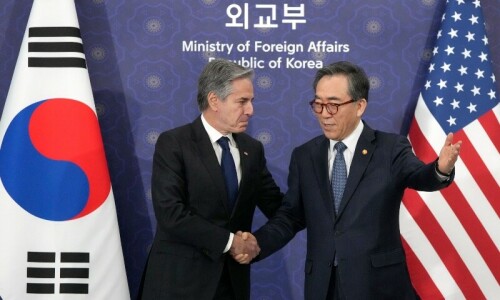THE consequences of war are assessed in the context of human losses and value of damaged property. Cultural, sociological and psychological impacts are often missed.
As per The Pakistan Economic Survey 2017-18 we sustained a loss of $126.79 billion to terrorism leading to displacement that threatened tribal-cultural integrity and altered demographic patterns. Operations in the tribal areas and Swat displaced 2.7 million to 3.5m people. In Swat, the displaced sought refuge in Mardan, Swabi and Charsadda. Local hospitality revived Pakhtunwali. Displacements tested philanthropic instincts. Operations in Fata and Swat forced migration to Karachi, Islamabad, D.I. Khan, Kohat, Peshawar, Charsadda, Abbottabad and Bannu affecting the peace indexation and socioeconomic indicators of these districts.
Post 9/11, there were property purchases by migrants in Peshawar’s walled city, diluting the Hindko-speaking presence. Displacement forced the rich tribal culture towards a transition led by technological innovations. Democratisation resulted in de-tribalisation and inconvenience for women and children. It enabled the youth to distinguish between collective and individual responsibility but also impeded rights to education, health and vote.
Militants attacked many educational institutes while the insertion of Article 25-A in the Constitution reflects the state’s realisation of education’s importance. Militancy also upset anti-polio efforts.
Did we capitalise on our opportunities?
To establish military courts and merge Fata with KP three constitutional amendments were made but strengthening ATCs remained a low priority. The 25th Amendment is not just a geographical merger. It’s a plan to strengthen national integration, rule of law and human rights and a realisation that delaying reforms can provide space to violent non-state actors. To deter intrusion, border fencing began in 2017, with 85 per cent so far completed. Cross-border attacks from Afghanistan fell from 82 in 2019 to 11 in 2020.
Terrorism badly impacted tourism — during its peak five-star hotels in Karachi, Peshawar, Gwadar and Islamabad were attacked. Improved peace in Karachi and CPEC areas led to 80pc annual hotel occupancy rate. Police Order 2002 was debatably amended and terrorism negatively impacted the pace of police reforms. Security challenges spawned specialised units that further militarised the police. Security threats made CT the top priority — with a negative effect on crime prevention and detection. A surge in kidnappings, bank robberies and extortion was recorded. Fortified police stations and reduced foot and mobile patrolling widened the gulf between police and community but the martyrdom of 7,069 police officials brought the two closer.
Surveillance of proscribed persons and groups is an added task. The courts, media and human right groups plugged the loopholes in the process. Presently, 79 groups are proscribed. In November 2018, 8,374 persons were on Schedule IV; the number today is 3,597, showing improved CTD scrutiny. The mushrooming of electronic media post-9/11 led to competition for ratings and glorification of terrorism. The National Action Plan barred this and the media improved its coverage of terrorism.
The ‘war on terror’ complicated matters. Issues like ‘collateral damage’, disappearances, targeted killings etc were widely covered but objective analysis was lacking. Human rights litigation registered an upward trend. A commission was constituted to deal with enforced disappearances. Since its inception, 6,944 cases were registered till Jan 31, 2021 and 4,822 disposed of. To compensate a family of a missing person, the Islamabad High Court ordered monthly compensation. In 2018, IHC termed the suspension of cellular services for security reasons illegal but in 2020 the Supreme Court ruled they could be suspended in “special circumstances”. For compensation for civilian victims of terrorism, Balochistan and Punjab enacted laws. Other provinces should follow suit.
Sadly, our LEAs are fighting 21st-century encrypted communications with 20th-century legislation. Though enhanced encryption was introduced to protect privacy this allowed criminals and terrorists to communicate secretly. The Constitution’s Article 140-A pertains to LGs and devolution. But while combating extremism, LGs remained underutilised. Besides kinetic measures, enactment of laws, institutional development and capacity building were priorities but synchronisation was weak.
Despite its security challenges Pakistan was the fifth largest contributor in 2018 to UN peacekeeping missions with 6,218 troops. In 2004, it was given Non-Nato Ally status by the US and since 2006 it has been elected a member of the UNHRC five times.
Every adversity exposes institutional and procedural weaknesses but also offers opportunities to reconsolidate positions and revamp institutions. The question is, did we capitalise on our opportunities?
The writer is author of Pakistan: In Between Extremism and Peace.
Twitter: @alibabakhel
Published in Dawn, May 5th, 2021







































